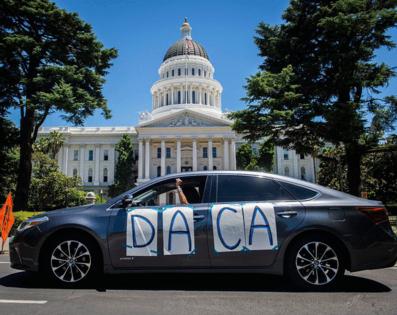Trump tried to end DACA, program helping undocumented immigrants, before. Will he try again?
Published in News & Features
President-elect Donald Trump’s promise to overhaul the nation’s immigration policy has heightened concerns about an already in limbo program benefiting more than 150,000 undocumented Californians.
The program — Deferred Action for Childhood Arrivals or DACA — grants residence and work permits to undocumented immigrants brought to the United States as children. DACA has faced challenges since 2017, when Trump’s first administration unsuccessfully sought to end it.
Today, the program remains tied in legal battles and about 530,000 undocumented immigrants across the country maintain their DACA protections. They can apply to renew for additional two-year terms, but new applications have been largely blocked since 2017.
Roughly 160,000 DACA recipients live in California.
Now, with Trump taking office in January, there’s increased uncertainty about the program. While he has not publicly stated a position on the program for this term, Trump ran on the campaign promise of instituting mass deportations. The case against DACA is also likely to make it to the Supreme Court during Trump’s second term, according to experts.
“I think it’s fairly certain that he will do everything he can via the power of the presidency to end it,” said Brian Lopez, a Sacramento-based immigration lawyer.
‘Their only hope’
Former President Barack Obama launched DACA in 2012 through an executive order to help immigrants often referred to as “Dreamers.”
Participation in the program comes with a range of benefits including authorization to remain in the country, work permits and health insurance from employers who offer it.
Trump moved to revoke the program just months after taking office in 2016. The decision faced immediate pushback with several states, including California, suing over the directive.
The case eventually made its way to the Supreme Court. In 2019, the court sided with DACA recipients and found that the Trump administration failed to provide a reasoned explanation for ending the program.
“The record seemed to show that the Trump administration ended it because they didn’t like it, as opposed to a full hearing of reasons,” said Hiroshi Motomura, faculty co-director of UCLA’s Center for Immigration Law and Policy.
Since then, other states have sued to end DACA. A federal judge ruled in their favor in 2021, calling the program unlawful and barring submissions from new applicants.
The case has since been appealed and is likely to end up in the Supreme Court again. A decision could come as late as the summer of 2026, Motomura said.
Recent research showed that a 50% decrease in California undocumented college student enrollment is linked to the restrictions put on the DACA.
Most of the undocumented students at Sacramento State are not eligible for DACA, said Kimberly Gomez, program coordinator for Sacramento State’s Dreamer Resource Center. These students are reliant on the program accepting new applicants.
“That’s their only hope,” Gomez said.
The average age of current DACA recipients is 29, according to the Migration Policy Institute.
‘Credit for killing it’
DACA is likely muddled in more uncertainty than some of Trump’s other immigration focuses.
While he could retry to end the program in a less “clumsy way,” Motomura said, there’s also a possibility that the president-elect decides not to touch the program for some time. He may wait for the decision from the now-conservative-leaning Supreme Court or try to avoid the political controversy.
Motomura predicts that the public may be more sympathetic to DACA recipients, many of which are attending college or working essential jobs. Trump has also shifted much of his anti-immigrant rhetoric toward mass deportations of other groups, Motomura added.
“He’s got options that are less politically fraught from going after DACA…on the other hand, he may want credit for killing it,” Motomura said.
Regardless, Gomez, Lopez, and Motomura urge eligible DACA recipients to renew their status before the start of Trump’s second presidency.
Renewals of these applications take an average of four months, according to the U.S. Citizenship and Immigration Services website. The wait time for all immigration applications are expected increase, given the concern of Trump’s incoming presidency.
“Anyone in this situation would, I’m sure, is thinking that they should get a renewal and they should get it approved before January,” Motomura said.
____
©2024 The Sacramento Bee. Visit at sacbee.com. Distributed by Tribune Content Agency, LLC.







Comments